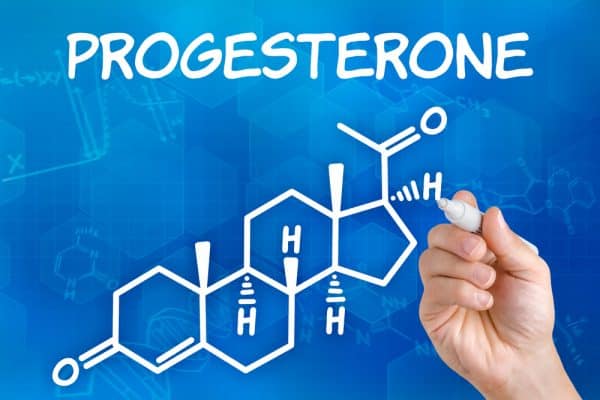We all know that oestrogen has a crucial role to play in all phases of a woman’s life, however little is heard of it’s sister hormone progesterone.
This hormone is super important! Progesterone’s main job is to prepare the womb for a healthy pregnancy but it does so much more than that. It's your calming hormone. It helps you sleep, reduces anxiety and balances out too much oestrogen.
Progesterone works alongside oestrogen in a balanced ratio, so when either hormone strays out of balance the other is affected, and symptoms can be felt.
You can watch the video below or listen to the podcast (episode 102).
What does it do?
Progesterone is a steroid hormone that is essential for healthy reproduction, but it is also crucial for a host of other things that you may not be aware of;
- Pregnancy – it’s main role is to protect the embryo and foetus all through pregnancy. Low levels can cause miscarriage and other problems
- Monthly cycle – progesterone is released in your luteal phase following ovulation to prepare the uterus for implantation. If your levels are low or don’t ovulate, you can get symptoms of PMS, headaches and heavy/painful periods
- Thyroid support – progesterone helps thyroid hormones get into your cells, (that’s why your temperature goes up at ovulation) – so low levels can contribute to fatigue, weight gain, feeling cold, hair loss, anxiety, depression and more
- Bone and muscle health – it promotes bone building cells (osteoblasts), protecting against osteoporosis, and promotes new muscle growth
- Sleep – it promotes the calming hormone GABA which helps reduce stress and induce sleep
- Mood – thought of as natures anti-depressant, progesterone enhances mood and reduces anxiety
- Hot flushes – by balancing oestrogen, progesterone may be a secret weapon to reduce hot flushes and night sweats
- Brain fog – it helps reduce brain fog and memory loss
- Skin – progesterone inhibits excess androgens (male hormones), reducing oily skin and breakouts, and helps to produce collagen
- Regulates oestrogen – and can reduce risk and severity of oestrogen driven conditions like fibroids, PCOS, endometriosis and breast/ovarian cancers
What causes deficiency?
- Peri-menopause – as our eggs start to run out, we skip ovulation and progesterone levels fall as a result
- Stress – when our bodies make cortisol to help us deal with stress, it sacrifices the production of progesterone – often at a time when we are already low!
- Too much oestrogen – if we have too high levels of oestrogen, then symptoms of low progesterone can be exacerbated
Measuring your progesterone levels
- Take your temperature during your luteal phase (from ovulation to the end of your cycle) – if it’s low, you may not have enough
- Lab tests – we use state of the art urine tests that accurately reflect your hormone levels during your luteal phase to identify a possible deficiency
How to increase progesterone naturally
You can do a lot to support your own natural production, even after menopause;
Nutrients;
There aren’t any foods that contain progesterone, but there are certain nutrients your body needs to produce it;
- Vitamin C – citrus fruits, bell peppers, sweet potato and lots more veg!
- Zinc – shell fish, meat, nuts, seeds (pumpkin and flax)
- Magnesium – nuts, seeds, green leafy veg, avocado, legumes, beans, dark chocolate
- Vitamin E – almonds, sunflower seeds, vegetables
- Vitamin B6 – salmon, meat, walnuts, beans, sweet potatoes, bananas
Manage your Stress;
- Switch off daily; meditation, mindfulness, walking in nature, music, reading – whatever it is that relaxes you, do it every day!
- Identify any hidden stressors – food sensitivities, gut problems, hormone imbalances, nutrient deficiencies (we test for all these if you want help with this)
Reduce excess oestrogen levels;
- Balance blood sugar to reduce excess insulin
- Reduce refined carbs and sugar, alcohol and processed foods
- Include phytoestrogens to balance oestrogen levels – organic soy, flaxseeds, lentils, chick peas
- Minimise exposure to xeno-estrogens in the environment, including BPA, pesticides and synthetic fragrances
Supplements
Check out my recommended supplements, and always check with your Doctor if you are on any medication before taking anything new.
- A good quality Multi Vitamin – with active levels of vitamins and minerals
- Magnesium – glycinate or citrate are my favourite forms
- Vitamin C
- Vitamin D3 and K2
- DIM for excess oestrogen
- Chromium for blood sugar support
- Adrenal support – eg ashwaghanda, rhodiola
- Agnus Castus Vitex – a herb that can help to stimulate progesterone
If after trying all this, your levels continue to be low and you have symptoms (especially poor sleep and/or anxiety), please see your Doctor about natural progesterone replacement – you want to make sure you’re given body-identical or micronized progesterone NOT progestins which are synthetic and are not the same. Progestins are found in combination HRT treatments (eg combined patch, tablets, implants), the Birth Control Pill and in smaller quantities in the Mirena coil.
Be very careful buying progesterone creams on the internet. Only a few have actual progesterone as the ingredient (not just yam extract), but know that these are unlicensed and unregulated. DIY hormone treatment is not something I would recommend! Ideally you need your hormones tested to know what your body needs, but if you can't afford to invest in this privately, then speak to your doctor about trying Utrogestan – the only licensed progesterone available on the NHS .
If you would like to discuss whether our hormone tests would benefit you, please get in touch.

